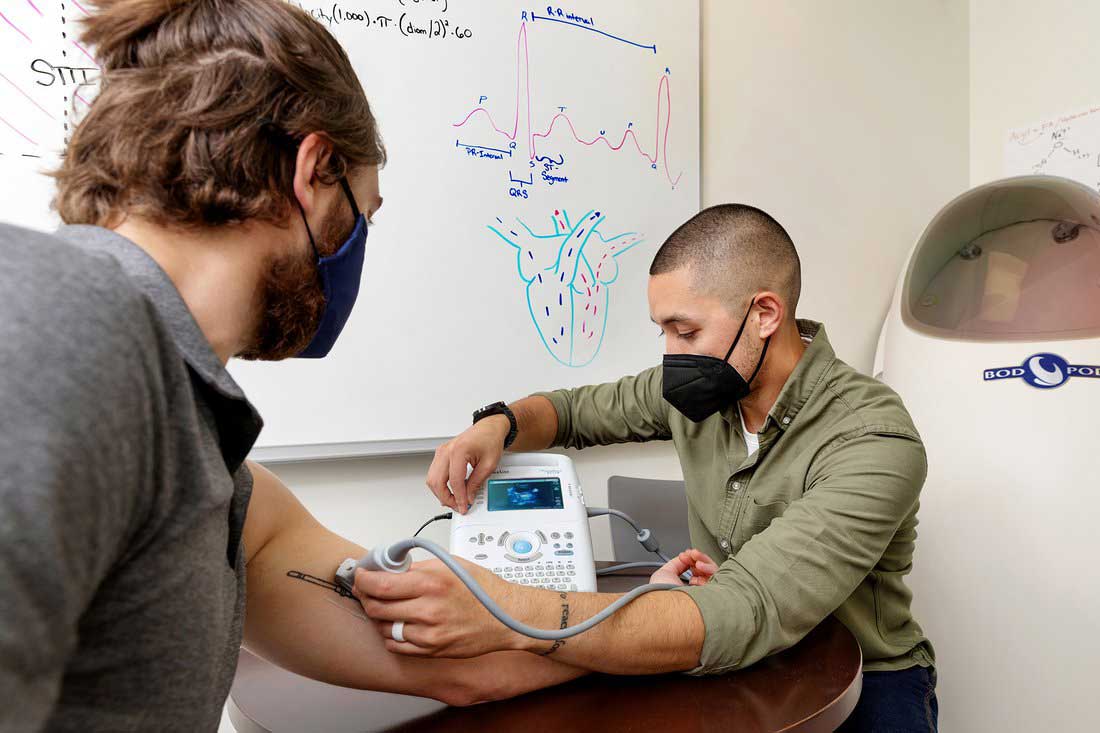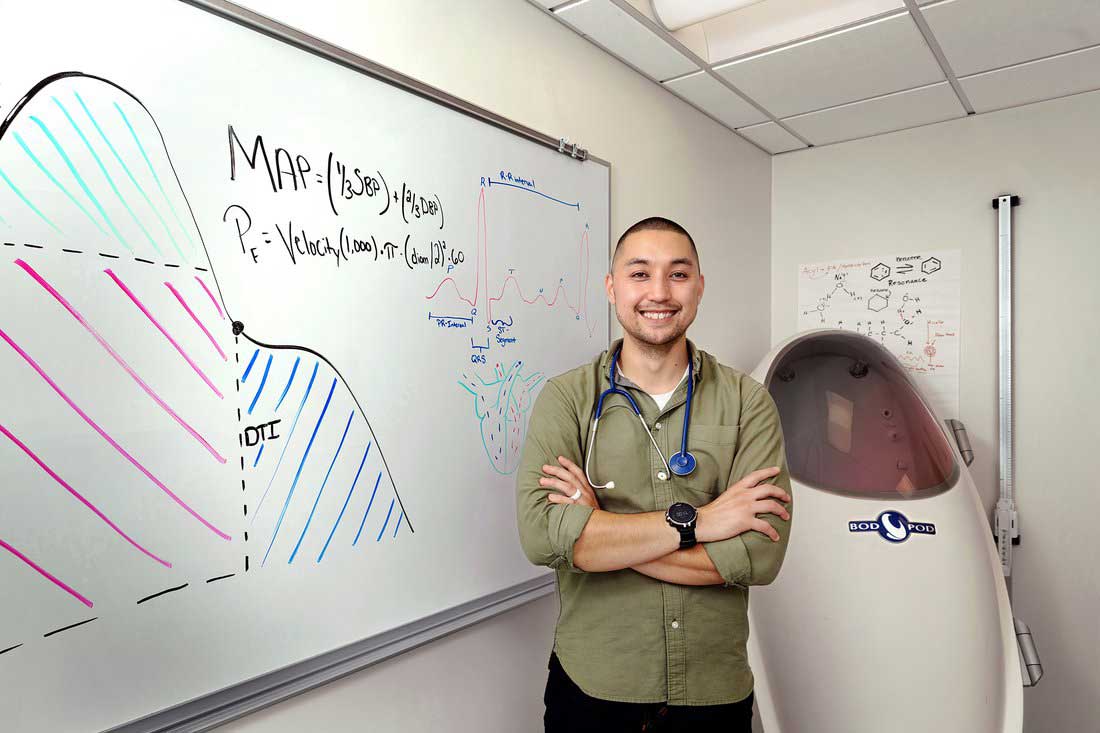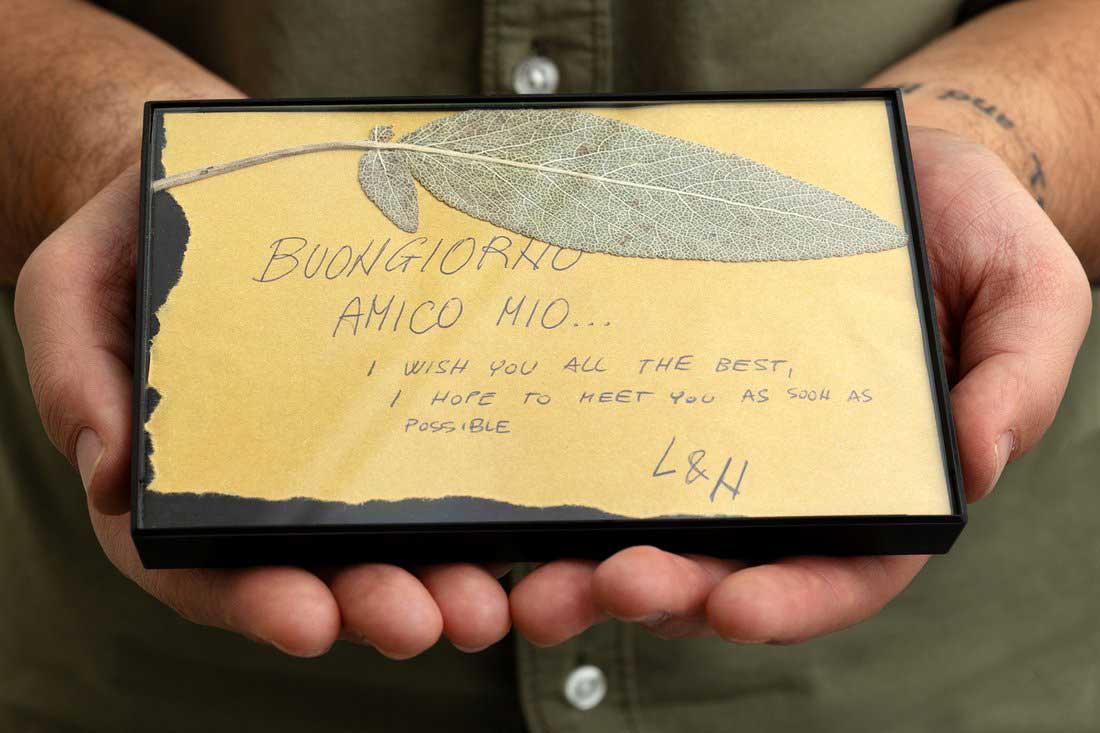
As a former explosive technician with the U.S. Air Force, Justin Pascual ’20, G’22 knows what it takes to stay focused in the field of duty and intentional in his actions. That’s why the nutrition science graduate student at Falk College wants to next support the military by becoming a naval aerospace and operational physiologist in the United States Navy. He plans to use his knowledge of nutrition and human physiology to prepare military members for the physiological stressors of a combat-based career.
Pascual earned a bachelor’s degree in nutrition science from Falk College. While stationed outside Cambridge, England, at the Royal Air Force Mildenhall, he met a group of civilians, including a nutritionist, working with members of the Special Forces team. Through this interaction, he saw firsthand the power proper nutrition could have on military members. He always had a passion for health and wellness and thought he could merge that interest with his military career by becoming a military dietician. He left his active-duty post to seek his degree at Syracuse University, which is highly ranked among veterans. Eventually, he shifted his focus toward using nutrition and exercise science to improve cardiovascular health in the military population.
Front Line Research
In his second year of his master’s program, Pascual is studying how nutrition alters human physiology and how this synergistic relationship can better prepare people for the stresses of military life. Through research, he found that orthostatic intolerance, a term used to classify specific ailments such as orthostatic hypotension, can significantly hinder the health of military members and civilians alike. He also learned that vitamin D might play a role in the onset of orthostatic intolerance.

Pascual is researching with Professor Kevin Heffernan, director of the Human Performance Laboratory and professor in the Department of Exercise Science, and Margaret Voss, nutritional biochemistry and metabolism professor in the Department of Nutrition and Food Studies, vitamin D’s relationship with orthostatic hypotension, a form of low blood pressure that happens when standing up from sitting or lying down. Specifically, Pascual is investigating how the otolith organs in the inner ear can help people withstand that change of position without getting dizzy. He’s researching how vitamin D affects the inner ear’s input to the cardiovascular system, an evolving sector of research regarding cardiovascular health. Individuals with lower vitamin D levels have showcased a higher risk for orthostatic intolerance. The military can utilize this information since many careers, including aircrew, fighter pilots, deep-sea divers and astronauts work in different gravitational environments that may affect their inner ears and cardiovascular systems.
To research this, Pascual conducted a pilot study out of the Human Performance Lab this fall with 23 participants, using an ultrasound machine to view the arteries during a position change and a sensory pen to measure how stiff the arteries are at any given moment. Pascual, Heffernan and Voss are using the rest of the fall semester to evaluate the data and start the next phase of the study, which is looking at the carotid artery in the neck and cerebral blood flow to the brain. “Using our research, we’ll be able to create a cohesive picture about what’s happening throughout the whole body.”
He’s incredibly appreciative of the mentorship he’s received from the faculty, calling it priceless. “Professors Heffernan’s and Voss’ collaborative guidance and mentorship are helping me to progress my academic and professional career. I can’t thank them enough.”
Transitioning From Military Life
One of the things Pascual values most about his time at Syracuse University is the support he’s offered as a student veteran. The Arizona native served in the Air Force for eight and a half years and now serves with the New York Air National Guard. He says bonding with fellow student veterans at the National Veterans Resource Center at the Daniel and Gayle D’Aniello Building (NVRC) and in the Students Veterans Organization (SVO) makes him feel more at home. “The support of the SVO and the NVRC is phenomenal.” He also recently joined SALUTE, the veterans national honor society, where he’s looking forward to becoming an active member and participating in networking events and seminars.
Pascual says the culture shock from military life to academic life is profound—everything from the general lifestyle to the way people communicate is different. He says that having dedicated spaces and transition programs for veterans helps with mental health and overall morale as compared to schools that do not have these resources.
Sage Advice
As an undergraduate, Pascual—who is also a Ronald E. McNair Scholar—studied abroad in Tuscany, Italy, as part of Falk College’s Mediterranean Food and Culture course offered at the Daniel and Gayle D’Aniello Syracuse University Program in Florence. He stayed on working farms during the “life-changing” trip and saw firsthand how the farmers worked together to grow their food.
The biggest lesson he learned from that trip was intentionality. “Everything the farmers did, from the way they cleaned their food to the way they treated their land and animals, was very intentional and pure.”

He keeps a reminder of that lesson over his desk at home in the form of a framed sage, picked straight from the forest for a dish, which was gifted to him as a memento by a chef he met on the trip. It’s been a good reminder to be intentional in his research by taking the time to ask himself at each turn if the next step will help with the end goal. “I ask myself can we discover an answer that’s going to potentially help an elderly fall risk individual? Can we do that with our research? If the answer is yes, I keep going. If the answer’s no, then I put it on the back burner.”
Being intentional is one of the many valuable lessons Pascual says he’s learned while at Syracuse. As someone who came from a background where a strong work ethic was prioritized over schoolwork, he says he finally understands the power of academics.
“A valuable lesson I learned at Syracuse is to leverage my knowledge, which empowers me to be of service to others—to be of better service to those who came before us and to those who come behind us.”
Adapted from an SU Story by Lisa Maresca originally published on November 16, 2021.
